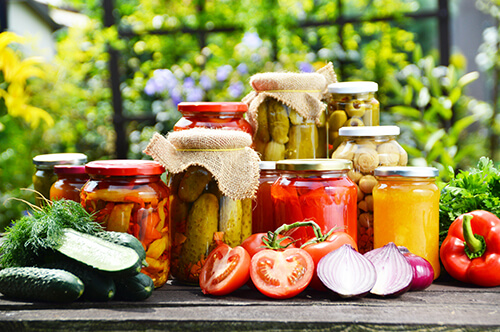Preserving Garden Goodies
Aug 17, 2020

After all the trouble of cultivating, planting, and maintaining your garden, now comes the best part — enjoying the fruits (and vegetables) of your labor. But if you don’t harvest and preserve your garden goodies correctly, all that work will go to waste.
Harvesting at peak quality, handling properly, and storing under optimum conditions help the overall taste and nutrition of homegrown produce. Fruits and vegetables continue to “live” even after picking, and except for ripening of immature products, storage does not improve the quality. Determining the point at which fruits and vegetables reach their peak is no easy task, so we encourage you to keep a record of each variety and its planting date to help when determining maturity.
During harvest, avoid damaging the produce and discard those with decay or rot so they don’t affect the others. Wash fruits and vegetables in cold running water immediately after harvesting to remove soil, dust, or other contaminants and help lower the temperature to preserve it faster.
Food is preserved by using methods that destroy or hinder the growth of microorganisms, such as molds, yeast, and bacteria. If you plan to preserve your produce by canning or freezing, adhere to strict safety guidelines to ensure safe consumption of these foods. Choose fresh, unblemished fruits and vegetables to preserve, and use proper canning methods and equipment. Pressure canners, like the 23-quart and 16-quart jars, are a must if you are going to can low-acid vegetables. A water-bath can be used for fruits, high-acid vegetables like tomatoes and pickles, and jams and jellies. These types of food do not require the time or high temperatures of a pressure canner to ward off the growth of bacteria.
You’ll also need canning jars, new lids and bands, a jar lifter, and a good funnel. It’s also nice to have equipment to make preparation of vegetables easier for cooking or canning.
For detailed instructions on proper canning methods, check with your local Extension office or download a wealth of information from www.utextension.utk.edu/publications/food. Visit your local Co-op for all your canning needs.
Harvesting at peak quality, handling properly, and storing under optimum conditions help the overall taste and nutrition of homegrown produce. Fruits and vegetables continue to “live” even after picking, and except for ripening of immature products, storage does not improve the quality. Determining the point at which fruits and vegetables reach their peak is no easy task, so we encourage you to keep a record of each variety and its planting date to help when determining maturity.
During harvest, avoid damaging the produce and discard those with decay or rot so they don’t affect the others. Wash fruits and vegetables in cold running water immediately after harvesting to remove soil, dust, or other contaminants and help lower the temperature to preserve it faster.
Food is preserved by using methods that destroy or hinder the growth of microorganisms, such as molds, yeast, and bacteria. If you plan to preserve your produce by canning or freezing, adhere to strict safety guidelines to ensure safe consumption of these foods. Choose fresh, unblemished fruits and vegetables to preserve, and use proper canning methods and equipment. Pressure canners, like the 23-quart and 16-quart jars, are a must if you are going to can low-acid vegetables. A water-bath can be used for fruits, high-acid vegetables like tomatoes and pickles, and jams and jellies. These types of food do not require the time or high temperatures of a pressure canner to ward off the growth of bacteria.
You’ll also need canning jars, new lids and bands, a jar lifter, and a good funnel. It’s also nice to have equipment to make preparation of vegetables easier for cooking or canning.
For detailed instructions on proper canning methods, check with your local Extension office or download a wealth of information from www.utextension.utk.edu/publications/food. Visit your local Co-op for all your canning needs.